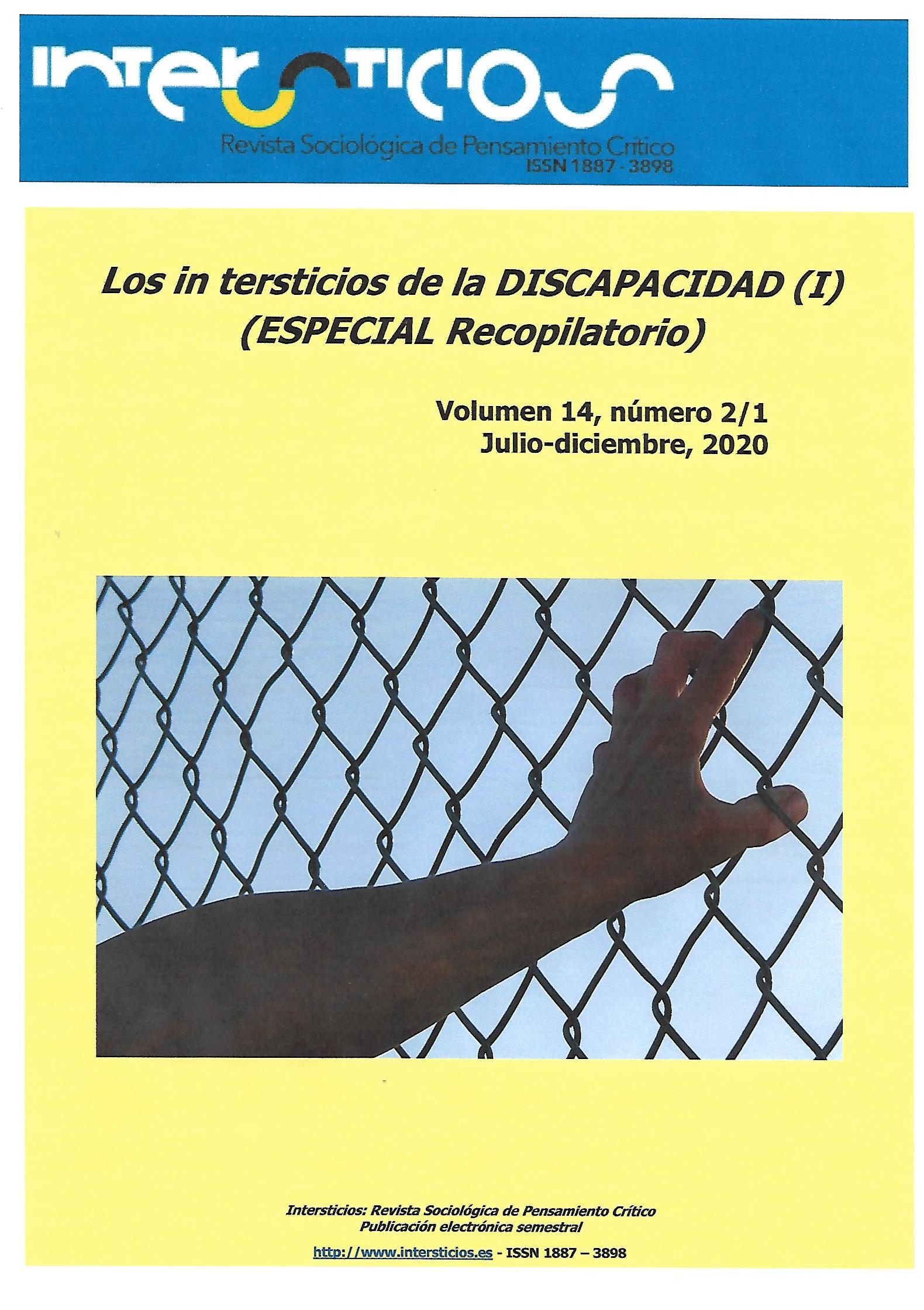Disability studies: what’s the point?
Keywords:
disability, social model, discrimination, activismAbstract
Unlike previous courses dealing with ‘disability’ related concerns in Britain and elsewhere, the focus was and remains clustered around the re-definition of disability by disabled people and their organisations and, what is generally referred to as the ‘social model of disability’. One, in contrast to the conventional individual medical model of disability, it is a de-liberate attempt to switch the focus away from the functional limitations of impaired individuals onto the problems caused by disabling environments, barriers and cultures. It is an holistic approach that explains specific problems experienced by disabled people in terms of the totality of disabling environments and cultures. This includes inaccessible education, information and communication systems, working environments, inadequate disability benefits, discriminatory health and social support services.The UPIAS re-definition of ‘disability’ was adopted by the international disabled people’s move-ment, as represented by Disabled People’s International, in 1981; albeit the terms ‘disability’ and ‘handicap’ were initially substituted for the words ‘impairment’ and ‘disability’ because of concern over the term ‘impairment’.References
Abberley, P. 1987: The Concept of Oppression and the Development of a Social Theory of Disability, repro-duced in L. Barton, and M. Oliver (eds), 1997: Disability Studies: Past Present and Future, Leeds: The Disability Press. (Also available on www.leeds.ac.uk/disability-studies/archiveuk/index).
Abberley, P. 1993: Disabled People and Normality, in J. Swain, et al., (eds), Disabling Barriers - Enabling Environments, London: Sage in Association with the Open University. (Also available on www.leeds.ac.uk/disability-studies/archiveuk/index).
Anderson, R. and Bury, M. (eds) 1988: Living with Chronic Illness, London: Unwin Hyman.
Barnes, C. 1996: ‘Forward’, in J.Campbell, and M. Oliver, Disability Politics: Understanding Our Past, Chan-ging Our Future, London: Routledge.
Barnes, C. Mercer, G. and Morgan, H. 2000: Creating independent Futures, Stage One Report, Leeds: The Disability Press. (Also available on www.leeds.ac.uk/disability-studies/archiveuk/index).
Bury, M. 1982: Chronic Illness as Biographical Disruption.
Sociology of Health and Illness, 4 (2): 167-82.
Davis, K. 1990: Activating the Social Model of Disability: the emergence of the seven needs, Derby: Derbys-hire Coalition of Disabled People.
Davis, L. J. 2000: ‘Dr Johnson, Amelia and the Discourse of Disability in the Eighteenth Century’ ‘in H. Deutsch and F. Nussbaum, eds. Defects: Engineering the Modern Body, Anne Arbor: The University of Michigan Press.
Davis, L. J. 1996: Enforcing Normalcy: Disability Deafness and the Body, London: Verso.
Finkelstein, V. 2002: ‘The Social Model of Disability Repossessed’, in Coalition: the Magazine of the Greater Coalition of Disabled People, Manchester: The Greater Manchester Coalition of Disabled People, Feb-ruary,10-16. (Also available on www.leeds.ac.uk/disability-studies/archiveuk/inde).
Finkelstein, V. 1980: Attitudes and Disability, Geneva, World Rehabilitation Fund. (Also available on www.leeds.ac.uk/disability-studies/archiveuk/index).
Gleeson, B. 1999: Geographies of Disability London: Routledge (especially Part 1).
Gillespie-Sells, K. and Campbell, J. 1991: Disability Equality Training, London: Disability Resource Team. (Also available on www.leeds.ac.uk/disability-studies/archiveuk/index).
Hunt, P. (ed.) 1966: A Critical Cindition in P. Hunt, Stigma: The Experience of Disability, London: Geoffrey Chapman. (Also available on www.leeds.ac.uk/disability-studies/archiveuk/index).
Linton, S. 1998: Claiming Disability, New York: New York University Press.
Michalko, R. 2002: The Difference that Disability Makes, Philadelphia: Temple University Press.
Miller E. J. and Gwynne G.V. 1972: A Life Apart. London: Tavistock.
OECD: 2003: Transforming Disability Into Ability: Policies to Promote Work and Income Security for Disabled People, Paris: Organisation for Economic Co-operation and Development.
Oliver, M. 2003: ‘If I had a hammer: the Social Model in Action’ in, C. Barnes and G. Mercer, eds. Implemen-ting the Social Model of Disability: Theory and Practice,
Leeds: the Disability Press (Forthcoming).
Oliver, M. 1990: The Politics of Disablement, Basingstoke: Macmillan.
Oorschot, V. and Hvinden, B. eds. 2001: Disability Policies in European Societies, The Hague: Kluwer Law International.
Rieser, R. 1990: 'Internalised Oppression: How it seems to me' in R.Rieser and M Mason (eds.) Disability Equality in the Classroom: a Human rights Issue, London: Inner London Education Authority. (Also available on www.leeds.ac.uk/disability-studies/archiveuk/index).
Rieser, R. and Mason M. (eds.) 1990: Disability Equality in the Classroom: a Human rights Issue, London: Inner London Education Authority.
Roulstone, A. 2000: ‘Disability,, Dependency and the New Deal or Disabled People’ in Disability and Society, 15 (7) 427-444.
Priestley, M. 1998: Constructions and Creations: Idealism and Materialism and Disability Theory, Disability and Society, 13 (1), 75-95.
Reeve, D. 2003: ‘Psycho-emotional Dimentions of Disability’ in, C. Barnes and G. Mercer, eds. Implementing the Social Model of Disability: Theory and Practice, Leeds: the Disability Press (Forthcoming).
Rioux, M. H. and Bach, M. 1994: Disability is Not Measles, Ontario: York University, Roeher Institute.
Shakespeare, T. 2006; Disability Rights and Wrongs, London: Routledge
Shakespeare, T. and Watson, N.. 2002: ‘The Social Model of Disability: an outmoded ideology’, Research in Social Science and Disability, 2, 9-28. . (Also available on www.leeds.ac.uk/disability-studies/archiveuk/index).
Thomas, C. 2003: ‘Developing the Social Relational in the Social of Disability: a theoretical agenda’, C. Bar-nes and G. Mercer, eds. Implementing the Social Model of Disability: Theory and Practice, Leeds: the Disability Press (Forthcoming).
Thomas, C. 1999: Female Forms: Experiencing and Understanding Disability, Milton Keynes: Open Universi-ty Press.
Titchovsky, T. 2003: Disability Self and Society, Toronto: University of Toronto Press.
UN. 1993: Standard Rules on the Equalization of Opportunities for Persons with Disabilities. New York: Uni-ted Nations
UPIAS. 1976: Fundamental Principles of Disability, London: Union of Physically Impaired Against Segrega-tion (Also available on www.leeds.ac.uk/disability-studies/archiveuk/index).
WHO. 2001: Rethinking Care from Disabled People's Perspectives. Geneva: World Health Organization (Also available on: www.leeds.ac.uk/disability-studies/archiveuk/index.)
Zarb, G. and Nadash, P. 1994: Cashing in on Independence, Derby: The British Council of Disabled People. (Also available on www.leeds.ac.uk/disability-studies/archiveuk/index).









